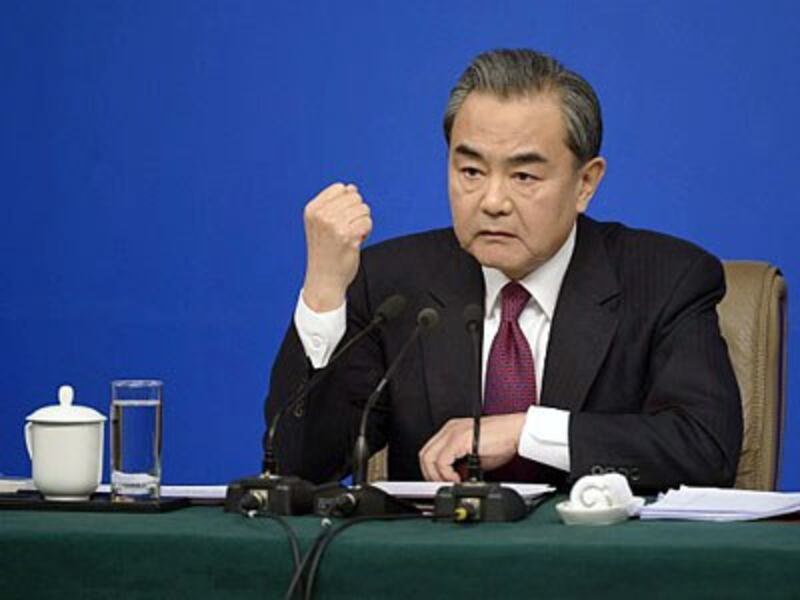Amid an ongoing war of words over Seoul's deployment of a U.S. antimissile defense system to counter the nuclear threat from the Stalinist North, China's boycott of South Korean goods and services appears to be spreading across the country.
A decision by South Korea's Lotte retail conglomerate agreeing to a land swap with the South Korean government so the military can deploy the Terminal High Altitude Area Defense (THAAD) antimissile system last week has sparked sporadic protests against Lotte and store closures around China.
The Lotte group has also reported cyberattacks, while South Korean airlines have been refused permission to increase China-Korea flights, cosmetics firms have reported increased scrutiny at customs, and Chinese travel agents have stopped sending tour groups to the country.
Crowds have blockaded Lotte stores in Liaoning, Zhejiang, Jiangsu, Anhui, Qingdao, and the southwestern megacity of Chongqing, local residents told RFA.
A Chongqing resident surnamed Wang said he believes there is clear evidence that the Lotte boycotts have tacit government approval.
"All sorts of strange people have been showing up [at the blockade on Tuesday]," Wang said. "In today's China, nobody goes waving red flags and dancing on the streets without government approval."
"They won't even let a few dozen gather on the streets wearing masks [in protest at the smog]," he said.
He said the blockades had occurred in two places in Chongqing.
"A lot of people were gathered in these two spots, and the majority of them were laid-off workers," he said. "According to my knowledge, somebody mobilized them to go there, and is using them to create an incident on the streets."

‘Looming crisis’
Meanwhile, Chinese foreign minister Wang Yi warned on Wednesday of a “looming crisis” on the Korean peninsula.
In Nantong city in the eastern Chinese province of Jiangsu, residents said that their local Lotte store had been closed since Tuesday, along with a number of others in the city.
"Nantong is a pretty small, out-of-the-way place, but they have even shut down the Lotte stores here," a local resident surnamed Cao told RFA.
"They were open a few days ago, but they were shuttered [on Tuesday]," he said. "I'm not saying they are all shut; just the ones I know about."
Cao said the ostensible reason for the closures was a "fire and safety inspection."
"But the suppliers are already refusing to supply the stores in the city, so their supply line has been cut off, and they had to close," he said.
Meanwhile, a Beijing resident surnamed Li said he didn't agree with the boycott, because it was unevenly applied.
"Why didn't China boycott American goods when the U.S. sailed its aircraft carrier into the South China Sea?" Li said. "I don't agree with this."
"But the atmosphere in China nowadays is a bit like it was back in the Cultural Revolution [1966-1976]," he said. "The mood is very volatile among ordinary people, and it can be very easily whipped up by the government."
"Once that happens, it's totally irrational, and if you speak out against the boycott you're likely to be attacked by others," Li said.
‘Hard to wrap up’
A veteran military commentator who declined to be named said Beijing has mishandled the THAAD row by criticizing North Korea more strongly than usual amid heightened tensions caused by U.S.-South Korean joint military exercises.
"Actually, they are already on North Korea's side," he said. "And this business with Lotte is going to be very hard to wrap up."
"The foreign ministry said ... that there is no such thing as an anti-South Korea boycott, still less a violent anti-South Korea movement," the commentator said. "They are trying to play this whole thing down [now], and set limits to where it can go."
Wu Fei, senior fellow at the Chinese public diplomacy and international relations think tank Chahar Institute, however, said the speed with which THAAD is being implemented is totally unacceptable to China.
"The two sides engage in negotiations at various levels, whether deployment happens or not, but it seems as if there have been no bilateral talks between Beijing and Seoul, nor any trilateral negotiations between Washington, Seoul and Beijing," Wu told RFA.
"This is all moving much faster than Beijing thought it would, and it’s that speed ... that China finds unacceptable," he said.
"Basically, that's what I think Wang Yi is talking about," he said.
Reported by Yang Fan for RFA's Mandarin Service, and by Wong Siu-san and Sing Man for the Cantonese Service. Translated and edited by Luisetta Mudie.
